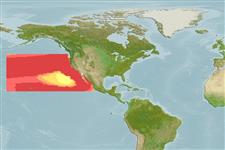>
Anguilliformes (Eels and morays) >
Nemichthyidae (Snipe eels)
Etymology: Nemichthys: Greek, nema, -atos = filament + Greek, ichthys = fish (Ref. 45335); larseni: Named for Verner Larsen, who began the study of this species while at the University of Copenhagen.
Eponymy: Verner Larsen is a Danish ichthyologist, who began revising Nemichthys whilst still a student at the University of Copenhagen, and who, according to the etymology, “…generously handed over his material” to the authors “…when he was unable to finish [...] (Ref. 128868), visit book page.
More on authors: Nielsen & Smith.
Environment: milieu / climate zone / depth range / distribution range
Ecologia
marinhas batipelágico; intervalo de profundidade 170 - 1280 m (Ref. 96339). Deep-water; 47°N - 17°N, 170°E - 105°W
Eastern Pacific: Oregon, USA to central Mexico, including the Gulf of California; also Hawaii and north of Hawaii to about 38°N.
Tamanho / Peso / Idade
Maturity: Lm ? range ? - ? cm
Max length : 161 cm TL macho/indeterminado; (Ref. 40789)
Descrição breve
Chaves de identificação | Morfologia | Morfometria
Raios dorsais moles (total) : 173 - 222; Raios anais moles: 164 - 208. Most easily distinguished from N. scolopaceus by its pale color; has more postorbital and preopercular pores. Rectangle formed by the lateral line pores is shorter and higher than in scolopaceus. Resembles N. curvirostris in its pale color but the subcutaneous dark bars are not as evident. May be instantly distinguished from curvirostris by the more numerous postorbital and preopercular pores and the much shorter and higher rectangle formed by the lateral line pores. Has smaller teeth than curvirostris.
Mesopelagic (Ref. 58302). Minimum depth from Ref. 58018.
Life cycle and mating behavior
Maturidade | Reprodução | Desova | Ovos | Fecundidade | Larvas
Nielsen, J.G. and D.G. Smith, 1978. The eel family Nemichthyidae (Pisces, Anguilliformes). Carlsberg Found., Dana-Rept. No. 88:71 p. (Ref. 7450)
Categoria na Lista Vermelha da IUCN (Ref. 130435: Version 2024-1)
Ameaça para o homem
Harmless
Utilização humana
Ferramentas
Relatórios especiais
Descarregue XML
Fontes da internet
Estimates based on models
Preferred temperature (Ref.
123201): 6.8 - 7.9, mean 7.4 °C (based on 6 cells).
Phylogenetic diversity index (Ref.
82804): PD
50 = 0.6270 [Uniqueness, from 0.5 = low to 2.0 = high].
Bayesian length-weight: a=0.00102 (0.00046 - 0.00225), b=3.06 (2.88 - 3.24), in cm total length, based on all LWR estimates for this body shape (Ref.
93245).
Nível Trófico (Ref.
69278): 3.5 ±0.5 se; based on size and trophs of closest relatives
Resiliência (Ref.
120179): Baixo, tempo mínimo de duplicação da população 4,5 - 14 anos (Assuming tmax>10).
Fishing Vulnerability (Ref.
59153): Very high vulnerability (90 of 100).
